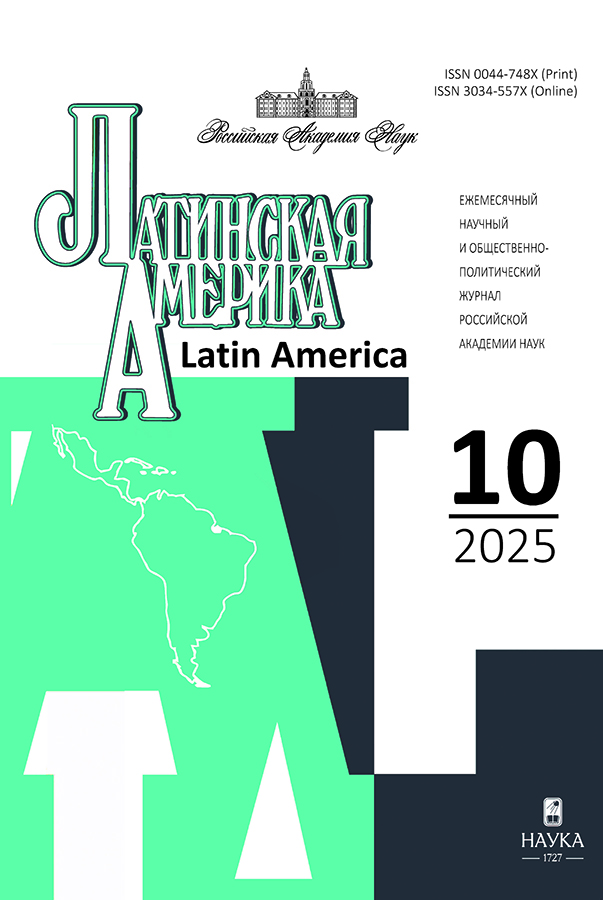Socio-economic determinants of centrifugal tendencies in the Basque Country at the present stage
- Authors: Belous Y.A.1,2
-
Affiliations:
- Centre for Comprehensive European and International Studies (CCEIS)
- National Research University Higher School of Economics
- Issue: No 2 (2024)
- Pages: 51-61
- Section: Iberian aspect
- URL: https://rjmseer.com/0044-748X/article/view/667961
- DOI: https://doi.org/10.31857/S0044748X24020042
- ID: 667961
Cite item
Abstract
This article reveals the socio-economic factors of centrifugal tendencies in the modern Spain (the Basque Country case) from 2009 to 2020. A correlation is revealed between the preferences of Basques regarding the territorial and political structure of Spain and a number of socio-economic factors such as GDP per capita, the unemployment rate, the level of average wages and the Consumer Price Index. The article also acquaints readers with the attitude of the Basques towards the regional government and their assessment of the economic situation in the region. The author concludes that one of the key factors is the Consumer Price Index, since as the price level rises, separatist sentiments also grow. Another important factor is the attitude of citizens towards the regional government: despite the assessment of the economic situation (bad or good), if the attitude towards the regional government is positive, centrifugal tendencies become more intense.
About the authors
Yulia A. Belous
Centre for Comprehensive European and International Studies (CCEIS); National Research University Higher School of Economics
Email: ybelous@hse.ru
ORCID iD: 0000-0002-0871-8223
PhD in History, Research Fellow, Deputy Director, Lecturer Moscow, Russian Federation
References
- Зарипова А.Р. Экономический фактор регионального сепаратизма в Испании: диссертация … кандидата политических наук: 23.00.02. Казань, 2019, 192 с. [Zaripova A.R Ekonomicheskij faktor regionalnogo separatizma v Ispanii: dissertaciya kandidata politicheskikh nauk [The economic factor of regional separatism in Spain: PhD theses]. Kazan, 2019, 192 p. (In Russ).
- Орлов А. А. Проблема сецессии на современном этапе. На примере Шотландии и Каталонии. Научно-аналитический журнал Обозреватель. 2015, № 1 (300), сс. 67-80 [Orlov A.A Problema secessii na sovremennom ehtape. Na primere Shotlandii i Katalonii [The problem of secession at the present stage. On the example of Scotland and Catalonia]. Nauchno analiticheskij zhurnal Obozrevatel. 2015, N 1, pp. 67-80. (In Russ).
- Фролова Ю. Н. Проблемы суверенитета и национального самоопределения в Испании в условиях глобализации: диссертация … кандидата политических наук: 23.00.04. СПб, 2017, 154 c. [Frolova Y.N Problemy suvereniteta i nacionalnogo-samoopredeleniya v Ispanii v usloviyakh globalizacii: dissertaciya kandidata politicheskikh-nauk [Problems of sovereignty and national self-determination in Spain in the context of globalization: PhD theses]. SPb, 2017, 154 p. (In Russ).
- PIB per capita de la Comunidad Valenciana. Datosmacro.ru. Available at: https://datosmacro.expansion.com/pib/espana-comunidades-autonomas/valencia?anio=2020 (accessed: 07.08.2022).
- PIB per capita de Galicia. Datosmacro.ru. Available at: https://datosmacro.expansion.com/pib/espana-comunidades-autonomas/galicia?anio=2020 (accessed: 07.08.2022).
- PIB per capita del País Vasco. Datosmacro.ru. Available at: https://datosmacro.expansion.com/pib/espana-comunidades-autonomas/pais-vasco?anio=2020 (accessed: 07.08.2022).
- PIB per capita de Cataluña. Datosmacro.ru. Available at: https://datosmacro.expansion.com/pib/espana-comunidades-autonomas/cataluna?anio=2020 (accessed: 07.08.2022).
- Estudio 2784. Preelectoral del País Vasco. Elecciones autonómicas 2009. Centro de Investigaciones Sociológicas, 2009. Pregunta 15. Available at: http://www.cis.es/cis/export/sites/default/-Archivos/Marginales/2780_2799/2784/e278400.html (accessed: 01.12.2020).
- Distribuciones de frecuencia marginales del estudio 2784. Centro de Investigaciones Sociológicas. Available at: http://www.cis.es/cis/export/sites/default/-Archivos/Marginales/2780_2799/2784/e278400.html (accessed: 01.12.2020).
- Estudio 3152. Preelectoral del País Vasco. Elecciones autonómicas 2016. Centro de Investigaciones Sociológicas, 2016. Pregunta 22 Available at: http://datos.cis.es/pdf/Es3152mar_A.pdf (accessed: 01.12.2020).
- Estudio 2959. Preelectoral del País Vasco. Elecciones autonómicas, 2012. Panel (1ª fase) (ARABA/ÁLAVA). Centro de Investigaciones Sociológicas, 2012. Pregunta 15. Available at: http://www.cis.es/cis/export/sites/default/-Archivos/Marginales/2940_2959/2959/Es2959Ala.pdf (accessed: 01.12.2020).
- Estudio 3275 Preelectoral del País Vasco. Elecciones autonómicas abril 2020. Centro de Investigaciones Sociológicas, 2020. Pregunta A19. Available at: http://www.cis.es/cis/ opencm/ES/1_encuestas/estudios/listaMuestras.jsp?estudio=14491 (accessed: 01.12.2020).
- Estudio 3286. Preelectoral del País Vasco. Elecciones autonómicas julio 2020. Centro de Investigaciones Sociológicas, 2020. Pregunta A17. Available at: http://datos.cis.es/pdf/Es3286mar_A.pdf (accessed: 01.12.2020).
- Unemployment Rate 2020. Statista. 2020. Available at: https://www.statista.com/statistics/263706/unemployment-rate-in-spain/ (accessed: 01.12.2020).
- EPA de la Comunidad Valenciana. Datosmacro.ru. Available at: https://datosmacro.expansion.com/paro-epa/espana-comunidades-autonomas/valencia (accessed: 07.08.2022).
- EPA de Galicia. Datosmacro.ru. Available at: https://datosmacro.expansion.com/paroepa/espana-comunidades-autonomas/galicia (accessed: 07.08.2022).
- EPA del País Vasco. Datosmacro.ru. Available at: https://datosmacro.expansion.com/paro-epa/espana-comunidades-autonomas/pais-vasco (accessed: 07.08.2022).
- EPA de Cataluña. Datosmacro.ru. Available at: https://datosmacro.expansion.com/paroepa/espana-comunidades-autonomas/cataluna (accessed: 07.08.2022).
- Salario Medio de la Comunidad Valenciana. Epdata.es. Available at: https://www.epdata.es/datos/salarios-ccaa-indefinido-temporal-sector-mujeres-hombres/155/comunidad-valenciana/299 (accessed: 07.08.2022).
- Salario Medio de Galicia. Epdata.es. Available at: https://www.epdata.es/datos/salariosccaa-indefinido-temporal-sector-mujeres-hombres/155/galicia/301 (accessed: 07.08.2022).
- Salario Medio de País Vasco. Epdata.es. Available at: https://www.epdata.es/datos/salarios-ccaa-indefinido-temporal-sector-mujeres-hombres/155/paisvasco/308 (accessed: 07.08.2022).
- Salario Medio de Cataluña. Epdata.es. Available at: https://www.epdata.es/datos/salarios-ccaaindefinido-temporal-sector-mujeres-hombres/155/ca-taluna/297 (accessed: 07.08.2022).
- IPC General de la Comunidad Valenciana. Datosmacro.ru. Available at: https://datosmacro.expansion.com/ipc-paises/espana-comunidades-autonomas/valencia?sc=IPC-IG (accessed: 07.08.2022).
- IPC General de Galicia. Datosmacro.ru. Available at: https://datosmacro.expansion.com/ipc-paises/espana-comunidades-autonomas/galicia (accessed: 07.08.2022).
- IPC General del País Vasco. Datosmacro.ru. Available at: https://datosmacro.expansion.com/ipc-paises/espana-comunidades-autonomas/pais-vasco (accessed: 07.08.2022).
- IPC General de Cataluña. Datosmacro.ru. Available at: https://datosmacro.expansion.com/ipc-paises/espana-comunidades-autonomas/cataluna (accessed: 07.08.2022).
- Preelectoral del País Vasco. Elecciones autonómicas 2009. Centro de Investigaciones Sociológicas, 2009. Available at: http://www.cis.es/cis/opencm/ES/1_encuestas/estudios/ver.jsp?estudio=9060&cuestionario=10614&muestra=16205 (accessed: 07.09.2022).
- Preelectoral del País Vasco. Elecciones autonómicas 2012. Centro de Investigaciones Sociológicas, 2012. Available at: http://www.cis.es/cis/export/sites/default/Archivos/Marginales/2940_2959/2959/Es2959Ala.pdf (accessed: 07.09.2022).
- Preelectoral del País Vasco. Elecciones autonómicas 2016. Centro de Investigaciones Sociológicas, 2016. Available at: http://datos.cis.es/pdf/Es3152mar_A.pdf (accessed: 07.09.2022).
- Preelectoral del País Vasco. Elecciones autonómicas 2020. Centro de Investigaciones Sociológicas, 2020. Available at: http://datos.cis.es/pdf/Es3286mar_A.pdf (accessed: 07.09.2022).
- Citizens’ awareness and perceptions of EU Regional Policy. June 2019. Eurobarometer 472. Results for Spain. Available at: https://search.gesis.org/research_data/ZA6966 (accessed: 27.12.2021).
- Krivushin I. The Contemporary World between Integration and Secession: A Challenge for Russia, Strategic Analysis. Strategic Analysis. 2016, N 40(6). pp. 524–535.
- Postelectoral del País Vasco. Elecciones Autonómicas 2020. Centro de Investigaciones Sociológicas, 2020. Available at: http://cis.es/cis/export/sites/default/Archivos/Marginales/3280_3299/3293/cru3293votoa2020.html (accessed: 26.09.2022).
- Белоус Ю.А., Тарасов А. С. Факторы центробежных тенденций в современной Испании: качественный сравнительный анализ. Вестник Пермского университета. Серия: Политология. 2021, № 1, сс. 45-56. [Belous Y.A., Tarasov A.S. Faktory centrobezhnykh tendencij v sovremennoj Ispanii: kachestvennyj sravnitelnyj analiz [Factors of centrifugal tendencies in modern Spain: a qualitative comparative analysis]. Vestnik Permskogo universiteta. Seriya: politologiya. 2021, N 1, pp. 45-56 (In Russ).
Supplementary files










